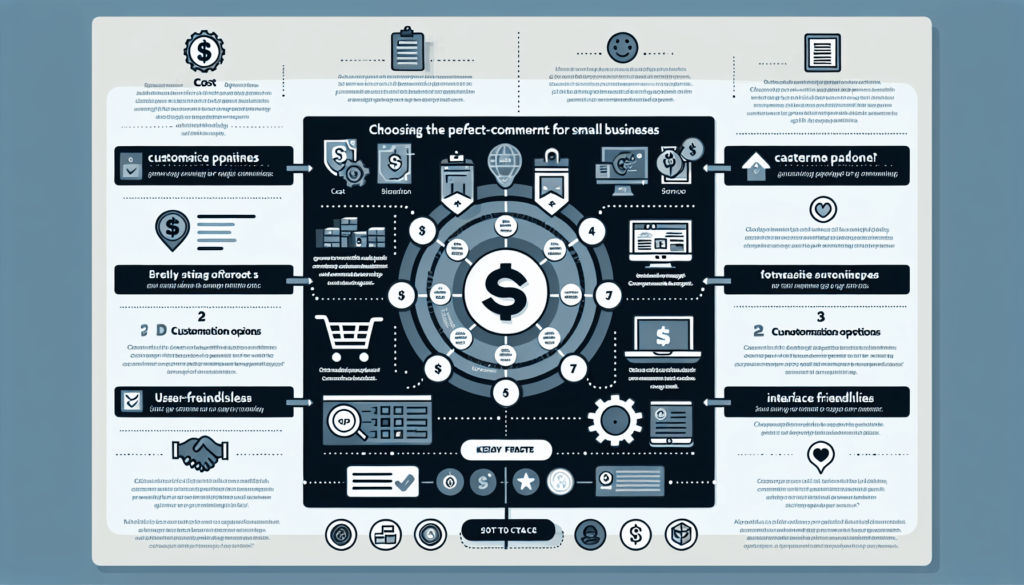So you're a small business owner looking to take your sales online? Well, you're in the right place! In this article, we're going to help you navigate the world of e-commerce platforms and find the perfect one for your business. With so many options out there, it can be overwhelming to know where to start. But fear not, we've narrowed down the top 10 e-commerce platforms that are ideal for small businesses like yours. Whether you're just starting out or looking to upgrade your current platform, we've got you covered. So let's dive in and find the perfect match for your online store!
Factors to Consider
When it comes to choosing an e-commerce platform for your small business, there are several factors you need to consider. Making the right decision can greatly impact the success of your online store, so it's important to take the time to evaluate each option. Here are some key factors to keep in mind:

Budget
One of the first things to consider is your budget. How much are you willing to invest in an e-commerce platform? Different platforms offer different pricing plans, so it's essential to find one that aligns with your financial resources. Keep in mind that while some platforms offer lower upfront costs, they may charge additional fees for certain features or transactions.
Scalability
As a small business owner, it's crucial to think about the long-term growth of your online store. You want a platform that can accommodate your future needs and easily scale as your business expands. Look for an e-commerce solution that offers flexibility and the ability to handle increased traffic and inventory without compromising on performance.
Ease of Use
Unless you have a dedicated IT team, you'll want a platform that is user-friendly and easy to navigate. Look for intuitive interfaces and drag-and-drop functionalities that will allow you to manage and update your online store with ease. A steep learning curve can be costly and time-consuming, especially for small business owners who need to focus on other aspects of their operation.
Mobile-Friendliness
With the increasing use of smartphones and tablets, having a mobile-friendly e-commerce platform is no longer optional. In fact, studies show that a significant portion of online sales now comes from mobile devices. Make sure the platform you choose offers responsive design and provides a seamless shopping experience for your mobile customers.

Integration with Other Tools
Consider the other tools you use to run your business, such as accounting software, email marketing platforms, or inventory management systems. It's important to choose an e-commerce platform that integrates well with these tools, as it can help streamline your operations and improve efficiency. Look for platforms that offer easy-to-use APIs or have built-in integrations with popular third-party applications.
Now that we have covered the factors to consider, let's take a closer look at some of the top e-commerce platforms available:
Platform Options
Shopify
Overview
Shopify is one of the most popular e-commerce platforms for small businesses. It offers a user-friendly interface and a wide range of features designed to help you create and manage your online store efficiently. With Shopify, you can choose from multiple themes and customize them to match your brand's look and feel.
Features
Shopify offers an extensive range of features, including inventory management, order processing, and customer relationship management (CRM) tools. It also provides built-in blogging functionality, SEO optimization, and support for multiple payment gateways.
Pricing
Shopify offers different pricing plans to cater to businesses of all sizes. The basic plan starts at $29 per month, while the more advanced plans offer additional features and capabilities at higher price points.
Pros and Cons
Pros: Easy to use, extensive features, reliable customer support.
Cons: Additional fees for some features, limited customization options.

WooCommerce
Overview
WooCommerce is a popular e-commerce plugin for WordPress. It seamlessly integrates with the WordPress platform, making it an excellent choice for small businesses already using WordPress for their website. WooCommerce offers a user-friendly interface and a wide range of customization options.
Features
WooCommerce provides all the essential features you need to start an online store, including product management, order processing, and payment gateway integrations. It also offers a vast library of extensions that allow you to add additional functionalities to your online store.
Pricing
WooCommerce is an open-source plugin, which means it is free to download and use. However, you will need to pay for web hosting and a domain name. Additionally, some premium extensions and themes may require additional investment.
Pros and Cons
Pros: Seamless integration with WordPress, customizable, cost-effective.
Cons: Requires more technical expertise, may require additional investment for premium extensions.
BigCommerce
Overview
BigCommerce is a robust e-commerce platform that offers a comprehensive set of features designed for businesses of all sizes. It provides a scalable solution, making it a suitable choice for small businesses planning to expand rapidly in the future.
Features
BigCommerce offers a wide range of features, including advanced SEO optimization, multi-channel selling, and a flexible product management system. It also provides a secure and reliable infrastructure to ensure the smooth operation of your online store.
Pricing
BigCommerce offers various pricing plans to accommodate businesses at different stages of growth. The plans start at $29.95 per month for small businesses and scale up as your business grows.
Pros and Cons
Pros: Scalable solution, extensive features, reliable infrastructure.
Cons: Higher price point for advanced features, limited design flexibility.

Magento
Overview
Magento is a robust e-commerce platform that caters to businesses of all sizes. It offers a high level of customization and flexibility, making it suitable for small businesses with unique requirements.
Features
Magento offers a wide range of features, including advanced product management, marketing tools, and internationalization capabilities. It provides a highly customizable framework that allows you to tailor your online store to your specific needs.
Pricing
Magento offers both a community edition (free) and an enterprise edition (paid). The enterprise edition provides additional features and support, but the cost can be substantial. Small businesses may find the community edition sufficient for their needs.
Pros and Cons
Pros: Highly customizable, extensive feature set, scalable.
Cons: Steeper learning curve, higher cost for enterprise edition.
Volusion
Overview
Volusion is an e-commerce platform designed specifically for small businesses. It offers an intuitive interface and a range of features aimed at helping entrepreneurs set up and manage their online stores with ease.
Features
Volusion provides a comprehensive set of features, including customizable templates, payment gateway integrations, and an easy-to-use product management system. It also offers built-in marketing tools to help you drive traffic to your store.
Pricing
Volusion offers different pricing plans to cater to businesses with varying needs. The plans start at $26 per month and increase in price as you require additional features and support.
Pros and Cons
Pros: User-friendly interface, comprehensive feature set, suitable for small businesses.
Cons: Limited scalability, additional fees for certain features.
Other Considerations
In addition to the factors outlined above, here are some other considerations to keep in mind when choosing an e-commerce platform for your small business:

Payment Options
Consider the payment options your platform supports. It's important to offer your customers a range of payment methods to maximize conversion rates. Look for platforms that integrate with popular payment gateways and support mobile payments.
Customization Abilities
Consider how much control you want over the design and functionality of your online store. Some platforms offer more customization options than others. If having complete control over the look and feel of your store is important to you, look for platforms that provide extensive design capabilities.
SEO Features
Search engine optimization (SEO) is essential for driving organic traffic to your online store. Look for platforms that offer built-in SEO features, such as customizable meta tags, SEO-friendly URLs, and automatic sitemap generation.
Security
Protecting your customers' sensitive data is crucial. Make sure the platform you choose provides robust security features, such as PCI compliance, SSL encryption, and regular security updates.
Customer Support
Consider the level of customer support offered by the platform. As a small business owner, it's important to have access to timely and reliable customer support to address any technical issues or concerns that may arise.
Conclusion
Choosing the right e-commerce platform for your small business is a decision that can greatly impact your online success. By considering factors such as budget, scalability, ease of use, mobile-friendliness, and integration with other tools, you can narrow down your options and find the platform that best suits your needs. Shopify, WooCommerce, BigCommerce, Magento, and Volusion are all excellent choices for small businesses, each with its own set of features, pricing, and pros and cons. Ultimately, the best platform for your business will depend on your specific requirements and goals. With careful consideration and research, you can find the perfect e-commerce platform to launch and grow your online store.
